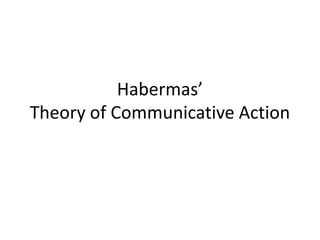Habermasﻗ Theory of Communicative Action
- 1. Habermasﻗ Theory of Communicative Action
- 2. Theory 1. Rational Arguments: Moral arguments based on rationality (vs. Horkheimer) ﺅ۷ p.134, 172 2. Justification and Application: Tension between why be morality (Aristotle) and how be moral(Kant) ﺅ۷ p. 128 3. Impartiality Condition: Universal binding norms derived from objective truth which is known through discourse and application ﺅ۷ p. 124, 137, 158-9, 164-5 4. Participant-Observer: Discourse, the process for finding understanding between pluralistic life forms ﺅ۷ p. 60, 142, 145, 156, 163, 166 ﺡ۸ 2010 Tabea Hirzel
- 3. Rational Arguments Kantﻗs categorical imperative claims impartiality by universalization Habermas adds appropiatness to this claim. Horkheimerﻗs ﺡ،ﻗ۵impossibility of deriving from reason any fundamental argument against murder.ﺡﭨ (p. 134) How: If we know truth we know the right action, we know how to be moral. Why: If we want to be rational we must be moral. Otherwise we commite a performative contradiction. ﺡ۸ 2010 Tabea Hirzel
- 4. Justification & Application Aristotle: Why be moral? ﺅ۷ justification of truth Kant: What ought to do? ﺅ۷ truth test Pragmatic: Purposive, the useful, rational, a relative ought Kantﻗs conditional imperative Ethic: Idealistic, the good, value decision, reflective, appropiative, self-understanding, identity of substance Kantﻗs unconditional imperative, Aristotles highest good Moral: Binding, the right, true, just, Kantﻗs categorical imperative If identity is interrelated, intersubjective ﺅ۷ ethics = moral If universality needs appropiatness ﺅ۷ moral = pragmatic Categories of action: Vs. Horkheimer: ﺡ، ﻗWith God dies eternal truthﻗ ﻗ۵ everything to do with morality derives from theology.ﺡﭨ (p. 137) Habermas: Justice and application are complementary (p. 154) ﺡ۸ 2010 Tabea Hirzel
- 5. Impartiality Condition Habermas: Discourse in ideal communication (. 145) as context transcending truth-claim decides on the right answer Horkheimerﻗ: ﺡ،The individual will ﻗ۵ becomes good when, through compassion, it recognizes its true identity with all other things. (p. 142) Moral argument on theﺡ،yesﺡﭨor ﺡ،noﺡﭨof a statementrequires Impartiality by universalization, i.e. abstraction from (a) motives, (b) particular situation, (c) concretecontext (p. 66) Impartiality by application, i.e. participationof theinfinitecommunicativecommu, translating universal normsin concrete contexts (speech acts) (p. 60, 124) Impartiality in process, i.e. useof arguments (p 156-7) in collectivedecisiontoachieveconviction(. 158) Justice is compassion/solidarity and conscience (p. 135)ﺅ۷ condition for identity (p. 154) and through communicative action it is integrative (p. 166) ﺡ۸ 2010 Tabea Hirzel
- 6. Discoursive Loop 1. Appeal 2. Question 3. Crisis 4. Consensus 5. Translation 6. Meaning 7. Response 8. Understanding ﺡ۸ 2010 Tabea Hirzel
- 7. Resume ﻗ۱ Deontological (p. 152): ﻗ Theological/Consquentialist: you shall not murder (right) ﻗ in order to live and avoid punishmente (from God) ﻗ Deontologict: you shall not murder (right) ﻗ because it is not good for you ﻗ Absolutist deontologist: you shall not kill (action) ﻗ because you are responsible for any bad consequence of your action ﻗ۱ Cognitive (p. 153) ﻗ۱ Formalistic (p. 156), formal pragmatism (p. 154) ﻗ۱ Universalistic (p. 145): ideal discourse, impartiality ﺡ۸ 2010 Tabea Hirzel







